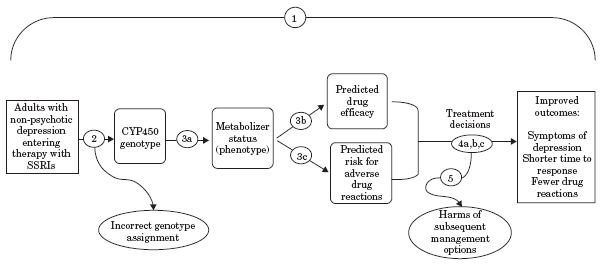Chapter 23 - The Evaluation of Genomic Applications in Practice and Prevention (EGAPP™) initiative: methods of the EGAPP™ Working Group Figures
This website is archived for historical purposes and is no longer being maintained or updated.
Human Genome Epidemiology (2nd ed.): Building the evidence for using genetic information to improve health and prevent disease
“The findings and conclusions in this book are those of the author(s) and do not
necessarily represent the views of the funding agency.”
necessarily represent the views of the funding agency.”
These chapters were published with modifications by Oxford University Press (2010)
Steven M. Teutsch, Linda A. Bradley, Glenn E. Palomaki, James E. Haddow, Margaret Piper, Ned Calonge, W. David Dotson, Michael P. Douglas, and Alfred O. Berg
Figures 23-1
Analytic framework and key questions for evaluating one application of a genetic test in a specific clinical scenario: Testing for Cytochrome P450 Polymorphisms in Adults with Nonpsychotic Depression Treated With Selective Serotonin Reuptake Inhibitors (SSRIs); modified from Reference 56. The numbers correspond to the following key questions:
1. Overarching question: Does testing for cytochrome P450 (CYP450) polymorphisms in adults entering selective serotonin reuptake inhibitor (SSRI) treatment for nonpsychotic depression lead to improvement in outcomes, or are testing results useful in medical, personal, or public health decision making?
2. What is the analytic validity of tests that identify key CYP450 polymorphisms? 3. Clinical validity: (a), How well do particular CYP450 genotypes predict metabolism of particular SSRIs? (b), How well does CYP450 testing predict drug efficacy? (c), Do factors such as race/ethnicity, diet, or other medications, affect these associations?
4. Clinical utility: (a), Does CYP450 testing influence depression management decisions by patients and providers in ways that could improve or worsen outcomes? (b), Does the identification of the CYP450 genotypes in adults entering SSRI treatment for nonpsychotic depression lead to improved clinical outcomes compared to not testing? (c), Are the testing results useful in medical, personal, or public health decision making? 5. What are the harms associated with testing for CYP450 polymorphisms and subsequent management options?

[A text description of this chart is also available.]
- Page last reviewed: January 6, 2010 (archived document)
- Content source:


 ShareCompartir
ShareCompartir